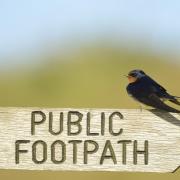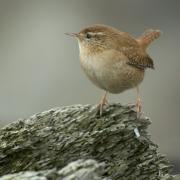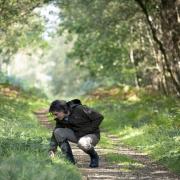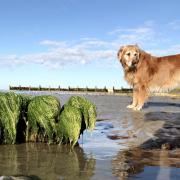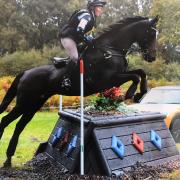It’s estimated that 15,000 sheep were killed by loose dogs in 2016 and unfortunately Sussex has the highest number of livestock-worrying incidents and attacks in the UK. Fran Benson talks to some of the people affected by this serious rural crime
It’s hard to imagine that our loyal canine companions could ever be responsible for injuring or causing the death of a sheep. But every year Sussex farmers have to deal with the aftermath of incidents that leave their sheep injured or dead.
Many farmers don’t even report incidents but it seems that the issue is on the rise. Attacks can happen at any time of year, although most take place January to March when many sheep are heavily pregnant or have lambs.
The worst recorded incident in the UK happened at West Dean, near Chichester, in March 2016. A flock was herded by a dog until the animals were squashed against a fence and 116 sheep, many of them pregnant, were either crushed or died of shock.
There are regular news stories across the county of smaller numbers of sheep being injured and killed by dogs. In the approach to lambing season worried ewes, even if they themselves are uninjured, may abort their lambs.
Shane Knight, 53, a Midhurst-based shepherd with a flock of around 350 located around the county, has a small flock of 14 Greyface Dartmoor sheep. One evening last winter he received a call telling him that a dog was attacking his rare pedigree sheep. The owner hadn’t been aware there were sheep nearby and his dog, a greyhound, had run off into the field and bitten eight of them. “There was a lot of blood,” says Shane. “One of my sheep had seven bites. Two ewes aborted through shock. I called the police and then the vet who came and stitched them all up.”
Shane was lucky in that there were witnesses to the attack and he was able to get the necessary medical help for his animals in time. The other pregnant ewes carried their lambs to term and delivered successfully. The dog owner also paid all the costs voluntarily: the vet’s bill was several thousand pounds.
There are lots of hidden costs for a farmer too. James Osman, Sussex NFU Adviser, says: “If the farmer is breeding for certain genetics, a lot of hard work can be lost and you can’t just replace it. A lot of farmers also have what are called ‘closed flocks’ which is where they don’t buy in animals so as to minimise the risk of disease. If they then lose animals and are forced to replace them they can compromise their status and risk other health problems. And then there’s the time involved in dealing with the case when they could be getting on with other jobs on the farm.”
There’s an emotional cost too – farmers have an attachment to their animals. Sergeant Tom Carter, who is the force operational lead for wildlife and rural crime and has attended many incidents of livestock attack, says: “I’ve had one farmer in tears when his sheep have been attacked.” It is very distressing. Not only are the animals they’ve loved and nurtured, and their livelihoods, under threat but sometimes the dog owners can be confrontational or on rare occasions they may have to shoot a dog.
One such situation happened in Chichester last year. A family puppy was shot by the shepherd when all attempts at controlling the dog, by the owners, police and shepherd, were exhausted. “It was horrendous,” says Tom. “It was a sustained attack of around 30 minutes. The dog was uncontrollable.”
It’s rare that dogs are shot. Often attacks happen when no one is around and the farmer finds a dead or dying sheep at a later time when nothing can be done. However, it’s a criminal offence to allow a dog to attack or run loose around livestock and the law allows a farmer to shoot a dog as a last resort.
“The majority of dog owners are responsible,” says Tom. But he comes across three typical situations: owners who will always act irresponsibly and say things like, “My dog is just playing”; owners who are responsible but for just one moment fail to appreciate there are livestock nearby and their dog gets away from them; and dogs who escape from a property or garden and go off and attack sheep (which is becoming an increasing problem in the High Weald in East Sussex).
It can happen to any dog. Kelly Cordell-Morris, a canine behaviourist and dog trainer in Petworth, says: “Dogs are a predatory species. Some dogs are more likely to hunt than others. It might take you completely by surprise as they’ve never done anything like that before but it’s a possibility for all dogs.” It doesn’t mean they will necessarily be aggressive with sheep, but they don’t need to be to cause the sheep a problem.
Regardless of a dog’s age, Kelly advises training classes to encourage a dog to pay attention to its owner. Then when out on a walk she suggests owners actively engage with their dog. Instead of just walking along and letting the dog do its own thing, hide treats for it to find, throw a ball and most importantly, reward the dog for paying attention and regularly checking in. She says know what your dog likes as a reward too, whether that’s leftover roast or cheese, so that it values the reward you give it.
Aside from training, all owners should put their dogs on a lead when they are close to livestock or choose an alternative route. It pays to be vigilant as there may not always be a sign.
The NFU have produced some yellow gatepost signs that tell owners to put their dog on a lead. They’ve also worked with Sussex Police to produce some portable green signs to advise walkers that sheep are in a field.
Tom advises that if you see a dog attacking or even just running loose among sheep to call 999. If the dog is back under control and you can identify the owner, then call 101. If it’s safe to do so, it helps if you can take photos or video of the event. You can also report through the Sussex Police website or anonymously via Crimestoppers.
He adds that if the dog causing the problem is your own dog, report it. “Owners love their dogs. Farmers love their sheep. If we swap the situation around, how would an owner like their dog to be attacked and be left dying in a field?”
The police don’t prosecute responsible owners. Instead they can help teach the dog how to behave around livestock. It also means that the farmer can get help for any injured sheep.
Hopefully with greater awareness, though, there will be fewer incidents to worry about.
Good to know
• Sussex has the worst record for livestock worrying and attacks
• Police data about livestock (mainly sheep) attacks from Sept 2013-Sept 2017 shows there were:
• 497 incidents of livestock worrying 612 livestock injured
• 589 livestock killed
• The dog’s owner wasn’t present 54 per cent of the time
• 13 dogs were shot
More…
• The ultimate Sussex walking guide - With the South Downs, quaint villages and coastal trails, Sussex is a great place for a walk. Here we round up some of the best




